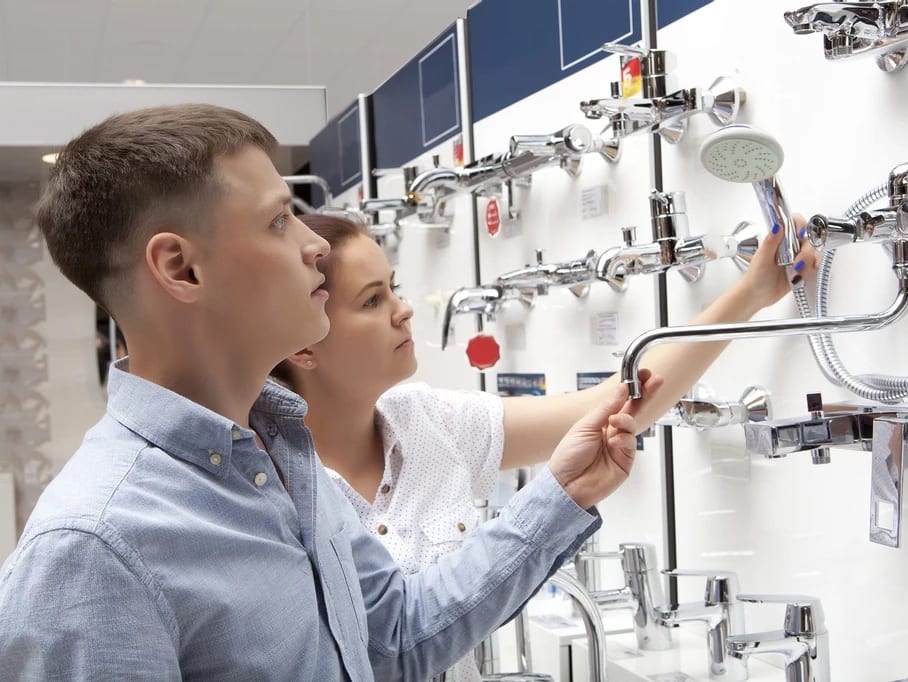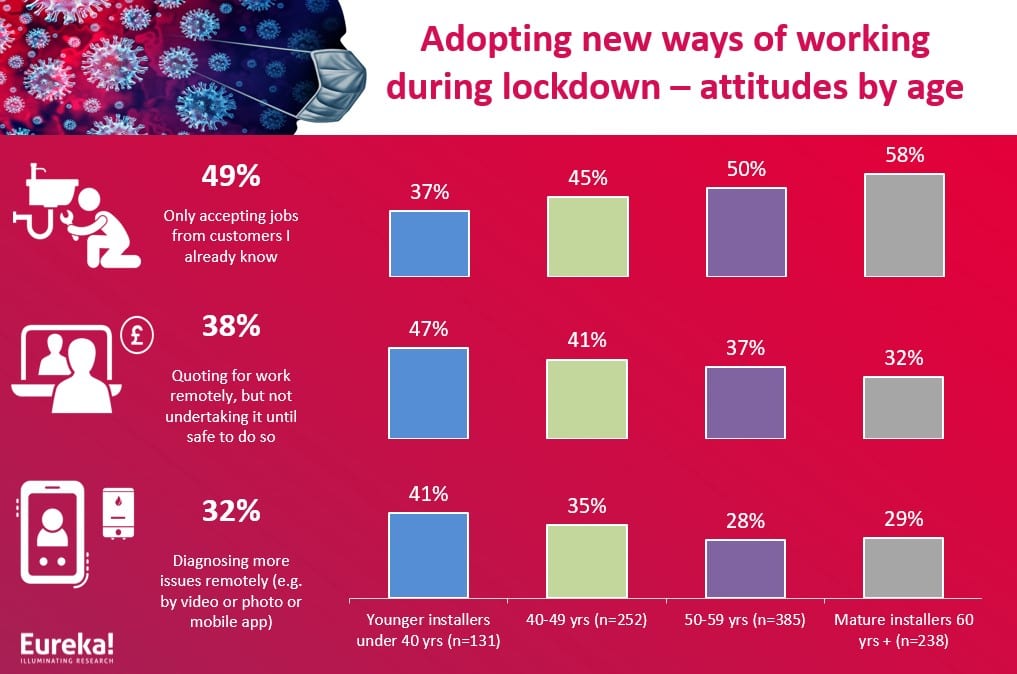COVID-19 has had a devastating impact on the plumbing, heating and associated supply chain. We calculate that the sector has been operating at just one-eighth of what it would in normal circumstances.
In terms of economic impact, the economy and associated supply chain has lost £47million for every weekday of lockdown. Four weeks in, that’s almost £1 billion that has been ‘lost’ to the sector and the wider economy.
How many tradespeople are working?
Eureka! Research has undertaken its own study into the impact of COVID-19 and interviewed a staggering 1,115 Plumbing & Heating business owners. This has allowed us to measure the true business and economic impact that COVID-19 has had on the home improvement, maintenance and broader construction sector.
Out of a total of around 100,000 plumbing and heating businesses in the UK, about half (c.47,000) have not been operating at all during lockdown thus far. Although some businesses have been responding to ‘emergency’ call-outs or breakdowns, clearly no sector can sustain this level of inactivity.
And now the dust is settling on lockdown, and the official public health recommendations are clearer in giving a mandate to the trade, a new way of operating must be found for businesses to survive.
Before we move onto those new ways of working, and some of the implications, we would like to thank once again all the stakeholders who have made this initial consultation possible.
We have had fantastic support and engagement with membership bodies such as CIPHE, APHC, CORGI and HHIC and brands from across the plumbing and heating sector have also stepped up to the mark, specifically Geberit, Vaillant, Glow-worm, Bristan and Salamander Pumps.
Installer Magazine has also been working on this initiative free of charge and we are grateful for their continued support.

New ways of working for tradespeople … and new habits
Installers are rapidly finding new ways of operating, particularly those who feel comfortable offering essential ‘emergency’ services to householders and businesses. Less than half have been offering a full emergency call-out service to date, with many being highly selective about who they respond to.
Moving forward into the next phase of the crisis, around half of installers have told us that they would consider undertaking jobs for existing customers. Operational businesses are on their own ‘front line’ and are adopting a wide range of strategies to manage health risks.
The risk of infection is naturally a source of concern for tradespeople. 3 in 10 business owners cite potential exposure to COVID-19 already and larger businesses in particular are having to deal with staff absenteeism and the associated risks.
To manage their own safety, installers are already adopting a 2 metre social distance when on a job and about 7 in 10 actively ask a householder to stay in a different part of a property.
Wearing gloves, wiping down surfaces or wearing a mask is not, as of yet, a universal procedure for tradespeople when in a customer’s home. It will be interesting to see how public health guidance evolves on this front. And, of course, there will be the need to be able to supply these tradespeople with the protective equipment that is most appropriate.
As the lockdown period continues and then begins to be lifted, how will these hygiene behaviours continue? Will they become the new normal in terms of what consumers expect from people entering their home? Or will people more rapidly fall back into their old ways?
As of this afternoon, plumbers and heating engineers, being classified as essential workers, can be tested for COVID-19. Moving forwards, will householders expect their tradespeople to demonstrate they are “clear” of the virus before permitting them into their home? Should the trade be volunteering this information to a customer when they arrive? It’s all a bit of a minefield to say the least.
The supply chain is one of the keys to recovery
Tradespeople have been telling us how buoyant the market was looking prior to the COVID-19 crisis. The order book looked healthy and installers were generally optimistic about the year ahead. And then things changed over-night.
As demand returns, two thirds of operating businesses however are concerned about getting hold of the materials and products they need to complete jobs. In the past few weeks only some ‘essential’ products have been available, making it virtually impossible to get their hands-on larger sheet materials, sanitaryware or tiles to undertake larger jobs for instance.
We have been measuring some channel shifts here at Eureka over recent years. But circumstances are now dictating a new pace of change. 64% have already adapted to using more click and collect or phone-ahead services that many merchants are now offering the trade (some have been quicker than others on this front, let’s be honest).
In some senses, old habits still die hard. It still appears that tradespeople, certainly ones working on domestic projects predominately, prefer to pick up their materials from the merchant. Only 1 in 7 told us that they were getting more products delivered straight to site.
But it will be fascinating to see how the changes tradespeople make to how they select and purchase product, and the extent to which they feel supported by their merchants during this period, carry over into the medium-longer term. Watch this space.
Transforming how tradespeople work
It’s probably over-stating things somewhat to claim that the COVID-19 crisis will result in a wholesale change to installer working behaviour. But there are certainly some interesting behavioural trends emerging.
A piece published by the AMA this week highlighted some of the ways that the lockdown is accelerating our use of technology generally, forcing us down paths a bit quicker than we would of naturally. And those behaviours are then quite likely to stick with us. The world won’t necessarily return to normal afterwards.
Consumers, in a very dramatic way, are now benefiting from having more leisure time with their families than they had ever probably dreamed of. No commuting during lockdown. Items delivered to their door. Card rather than cash purchases. More of a focus on quality of life. No dashing around for me, thank you very much. (We are not including the frustrations parents feel around home schooling in our analysis here by the way).
So how could this greater focus on the ‘experience economy’ impact on the installer? Well let us turn back to the data again briefly:
- Nearly 4 in 10 installers said that they would now consider quoting for jobs using remote technology
- One third said they would be looking to diagnose more plumbing and heating issues remotely – using video, phone or smart phone apps
- In both cases, it seems that younger installers are more open to using technology in this way than older guys
We have already seen new solutions entering the heating market that allow engineers to monitor the ‘health’ of a domestic system and check if adjustments or a visit is actually required. The range of possible applications that the connected smart home now presents is very exciting.
BOXT are also an example of a disruptive force in the world of boilers and we have written about this previously – Download here
While the very nature of an installer’s role will typically require them to visit a home or premises, it will be interesting to see how the leading manufacturers and suppliers can support the tradesperson with a range of well-designed products that fit into the brave new ‘customer experience’ economy. And offer a range of training and education packages that help them adapt this into their work.
It is already clear that some boiler manufacturers are ahead of the curve here and are being extremely proactive in providing CPD and continued support to their own installer community; strategies that will likely pay off as we return to some kind of normality.
We are all in it together, or are we? The power of the group over the individual
With a world that was seemingly becoming more fragmented with regimes pushing their own isolationist and nationalist doctrines, could a global pandemic change the way we think and push us back together, and how might this impact our sector?
Media, old and new, is awash with human kindness and the shared benefits of a common goal. And we too have seen an amazing act of togetherness in this study, with industry stakeholders working together rapidly in an unprecedented manner. The response from over 1,100 business owners collectively telling us about the state of their sector has also been impressive and, in our view, unprecedented.
Could the after-effects of this crisis lead to more installers coming together and joining the established associations that work on their behalf? We know that just a minority of installers currently subscribe to bodies such as the CIPHE and APHC, but could our need to stay informed and be more kind and supportive, working to the common good, be an excellent opportunity to grow the collective community voice in order to speak with a greater degree of authority when representing the sector with policy makers and government.
In a sector that is somewhat fragmented in terms of clear leadership and strategic focus, for the benefit of the trade, could we see a stronger better represented sector emerge later this year?
Download our full report, completely free, here

